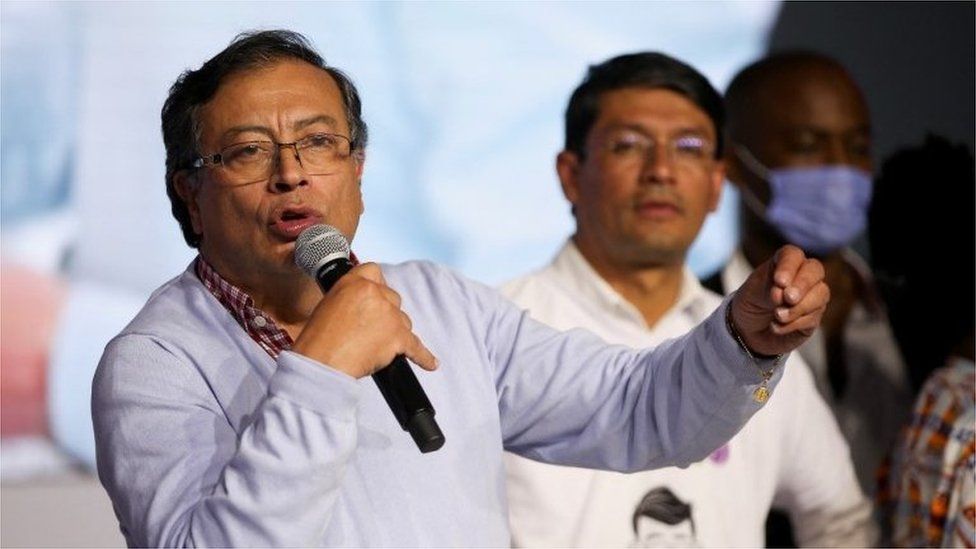RIO DE JANEIRO, BRAZIL – Six candidates will compete for the Presidency of Colombia on May 29 in elections in which the left can capitalize on the change demanded by the country to reach power for the first time, with Gustavo Petro the favorite in all polls.
In a country tired of the violence of the armed conflict, drug trafficking and crime, corruption, poverty, and inequality that surfaced in last year’s social protests, Petro, senator and former mayor of Bogota, found fertile ground for his discourse of change.
“Gustavo Petro is leading in the polls because he personifies the clearest expectation of change because he is a person that people do not perceive as a member of the political establishment,” said Sandra Borda, a political analyst and professor at the Universidad de los Andes.

Since the campaign began, Petro, a former M-19 guerrilla running for the presidency for the third time, has been ahead in the polls. Until a few days ago, it was almost certain that he would go to a second round with Federico “Fico” Gutierrez of the right-wing coalition Team for Colombia; however, that scenario no longer seems so clear.
The presidential race took a last-minute turn with the rise in the polls of engineer Rodolfo Hernandez, an independent populist who, with a sharp tongue against the corrupt, is closing in on Gutierrez’s second place and, therefore, on the possibility of contesting the second round with Petro.
Hernandez also added on Friday the support of former FARC hostage Ingrid Betancourt, the only woman in the race, who, in light of her poor results in the polls, decided to drop out of the presidential race and back the engineer, whom she considers the only one who can defeat the system of corruption.
It remains to be seen how much more Hernandez can grow in the remaining days until the elections and if he can put in check first Gutierrez and then Petro, who also has the support of an important sector of the opinion vote that feels represented in the Afro-Colombian social leader Francia Marquez, his running mate and the most mediatic of the candidates for the Vice-Presidency.
FEAR OF PETRO
About Petro, Gutiérrez warns that “change cannot be a leap into the void”, in allusion to the fears that the candidate of the left awakens in a vast sector of the country for having spoken in the past of sympathy with Chavism and expropriations, something from which he has had a hard time disassociating himself.
“There is a part of that fear that seems to me to be unfounded, which is this idea that the right has tried to spread that Petro is going to turn Colombia into Venezuela, which is a great exaggeration,” adds the analyst.
Borda explains “that the fact that someone is proposing social and economic reform policies does not necessarily mean that we are going to end up like Venezuela”, but she does see that there are old statements by Petro that, although they have changed, they do not seem “completely committed to the institutionality of the country nor in some occasions do they seem to be too respectful of the rule of law”.
“I don’t think one can necessarily classify him as an authoritarian guy and one who is going to do away with the country’s institutionality, but I would say that his commitment to that institutionality is ambiguous and is intentionally ambiguous because he knows that those institutions are part of what people are fed up with,” he adds.
What Petro does not seem to have changed is his insistence on putting an expiration date on the oil industry by suspending exploration contracts to move towards “a productive, non-extractivist economy” and make a “transition to clean energies”, which scares the markets because crude oil represents 5% of Colombian GDP and 55% of national exports.
In a meeting with representatives of US companies, Petro compared the oil and coal -two legal industries- with cocaine and said that “they are three poisons” to raise more blisters.
In contrast, “Fico” Gutiérrez, former mayor of Medellín, bases his discourse on “the defense of democracy and freedoms”, among them that of business, which makes him the favorite of the economic unions, and Hernández hits the key of the fight against corruption.
MISPLACED CENTER
In this campaign, dirty in many respects and full of vague ideas, the center, with which he says the majority of the electorate identifies, has been fading to the point that his candidate, the former mayor of Medellin Sergio Fajardo, third in 2018 with 4.6 million votes, languishes this time in fourth place in the polls.
“Sergio Fajardo has not been able to convince many people who need a slightly more radical approach to change (…), and I think that the discourse of moderation and gradual and institutional change is something for which people no longer have patience,” says Borda.
The center’s candidacy began to take water due to the internal divisions of its pre-candidates, among which was Ingrid Betancourt, who in only nine days, went in and out of the Centro Esperanza coalition and finally withdrew from the race.
And Fajardo, as leader of the center, had neither the strength nor the spirit necessary to close wounds and recompose the bloc.
Behind Fajardo, only the senator and evangelical pastor John Milton Rodríguez and the conservative lawyer Enrique Gómez Martínez remain since another aspirant, the former governor of Antioquia Luis Pérez, also withdrew given his null possibilities of winning in these elections which, everything indicates, will be defined in a second round on June 19 between the two most voted candidates.
With information from EFE

